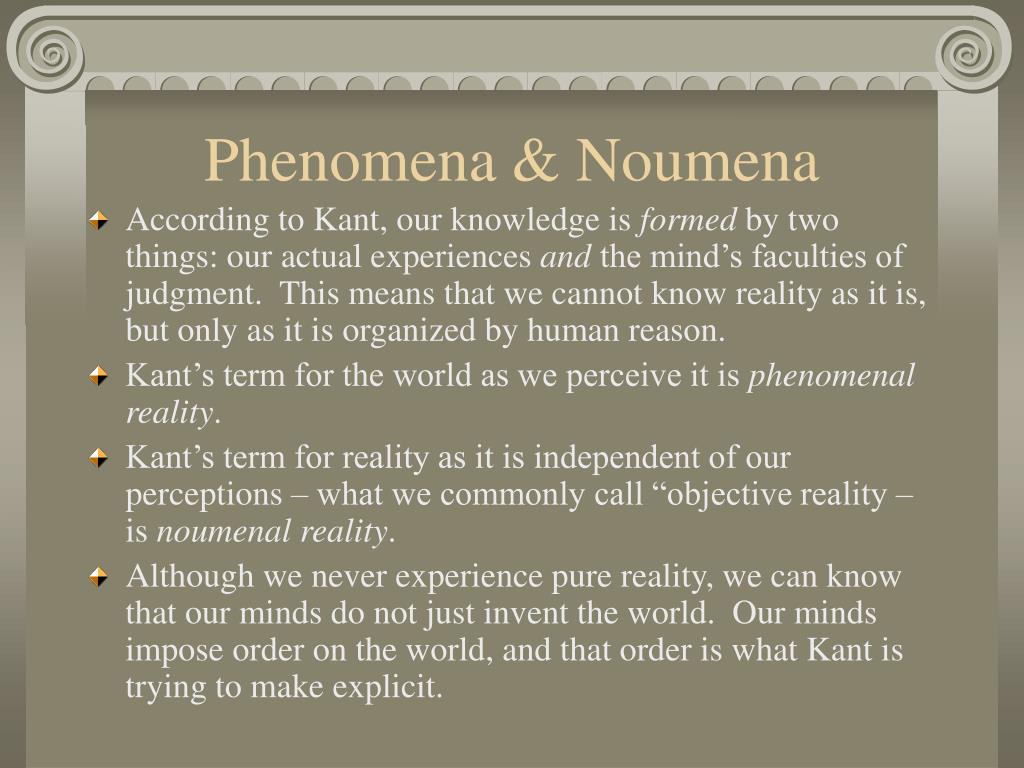
Such a beyond-experience does not have any positive content of its own and thus is not susceptible to experience it only “takes up space” in the sense that the distinction makes it necessary (B 307). On the other, as soon as we distinguish logically between the appearance of the object and the thing-in-itself, logically we open up a certain space that lies beyond the limits of experience, which Kant calls the noumenal (B 306-307). On one hand, the categories do not exist, strictly, though non-existence is a logical determination, not something apprehensible as an experience (A 243-44, B 301-302). Ultimately, for Kant, the importance of these distinctions between potential-for-knowledge, objects-of-knowledge, and combinations-that-constitute-knowledge are that they make possible true self-knowledge, the distinction between the products of experience and the framework that makes experience possible (B 293-94).īecause all knowledge is objective, which is to say that it involves a thinking self apprehending the appearances of non-self entities by means of senses and categories, two ranges of philosophical terms become, by definition, inaccessible, even as they retain names for the sake of drawing that boundary. As before, the potential of a room to involve a cat does not “belong” to the room itself but decidedly stands as a combination of one of reason’s capacities (to distinguish between potential and actuality) and the senses’ capacities (to see a cat or to see a room without a cat). Such a distinction doesn’t make the category “potential room” unreasonable it makes it reasonable categorically.īut the categories “potential” and “actual” are not themselves knowledge but just the shape that knowledge could possibly take (B 288). After all, when one observes the cat in the room, there’s no way to measure any capacity the room had before the cat came into the room (such a counter-factual room is also a function of reason) one must posit concepts about rooms and the passage of time and the relationships between states-of-room and states-of-cat. Likewise the difference between a cat potentially entering the room and a cat actually being in the room is a function of reason. To use the classic high-school-science-class example, the potential energy that a heavy object on a high shelf represents is something that reason can anticipate and even calculate, but nothing about the object on the shelf transmits that potential energy directly to the senses. The relationships between objective world and reasoning self are always dialectical, though: the concepts of actual happenings, potential happenings, and necessary happenings are functions of reason, not things that one can receive as sensory experience (A 233-34, B 286). CPR doesn’t leave the matter simply to logic, though: turning to the ways in which we know that time passes, he notes that temporal awareness, which is logically prior to self-awareness, itself relies on objective changes in the world around us (B 277-78). Since time is itself a phenomenon of the world, not of the self, the world must exist in order for the self to know the self at all (B 275-76).

Paying attention to the way the self actually works, Kant notes that the self only knows the self in terms of thoughts, and the way thoughts work, a person will have a thought now that she didn’t have just a moment ago, and that assumes the passage of time. Kant begins this section dispensing with one of the central doubts of Descartes and later of Berkeley, namely that there might or might not be an external world, but the only certainly available is that the mind exists.




 0 kommentar(er)
0 kommentar(er)
